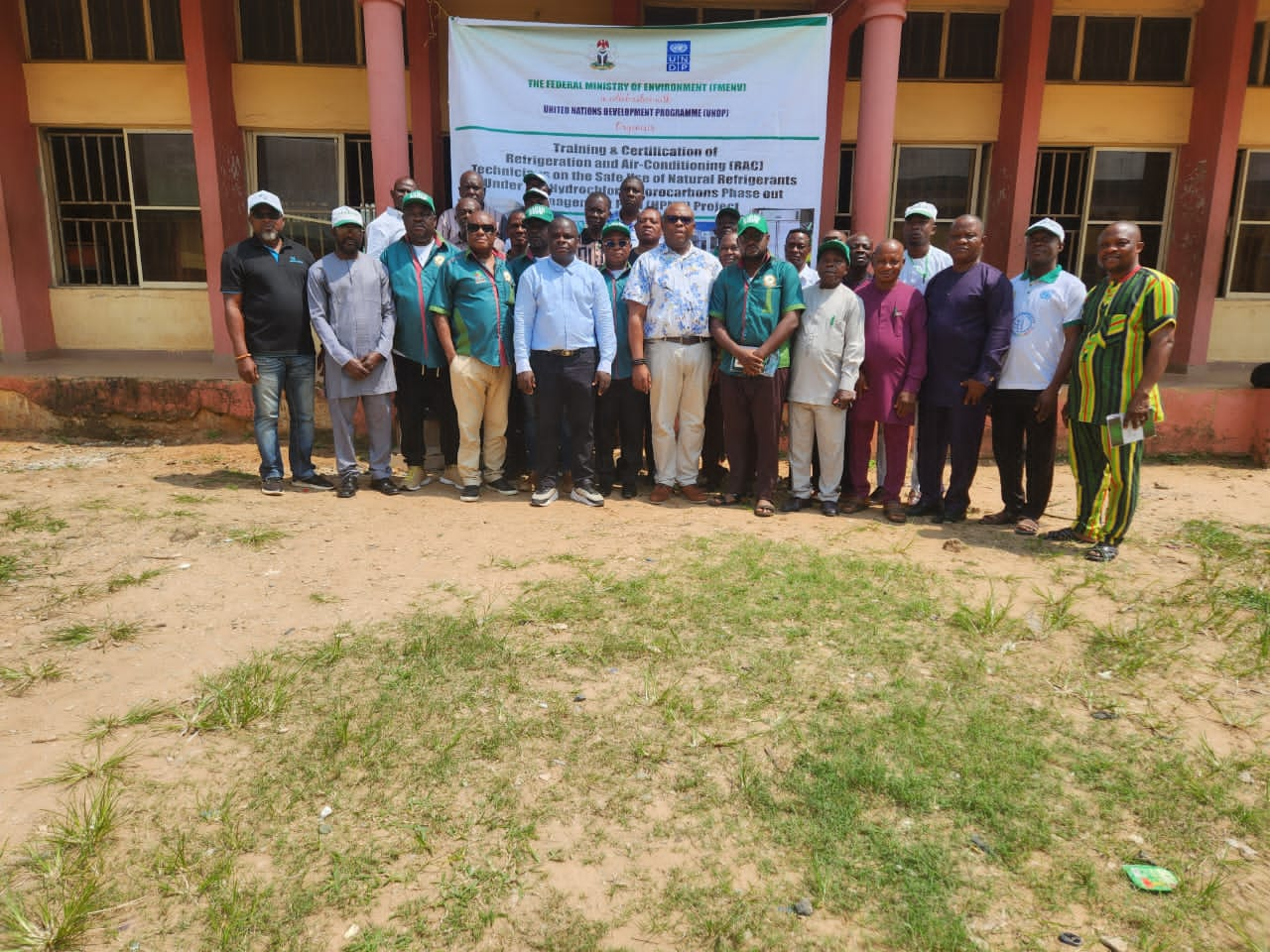By; IMRANA ABDULLAHI, Kaduna The Federal Government of Nigeria, in collaboration with the United Nations Development Programme (UNDP),
By; IMRANA ABDULLAHI, Kaduna
The Federal Government of Nigeria, in collaboration with the United Nations Development Programme (UNDP), has concluded a four-day nationwide training and certification program for Refrigeration and Air-Conditioning (RAC) technicians.
The first batch of the training, held from August 18 to 21 2025, was simultaneously conducted in Kano, Lagos, Port Harcourt, and Awka, reaching technicians across the North-West, South-West, South-South, and South-East regions.
The second batch of the same training will be conducted later in the year for the Norh-Central and North-East Zones of the country. Previously, the same training was conducted for 40 RAC Technicians in Abuja at Government Science and Technical College, Garki, Abuja, in July, this year.
At the opening ceremony in Kano at Government Technical College, Kano, the Director, National Ozone Office of the Department of Pollution Control & Environmental Health, Federal Ministry of Environment and National Ozone Officer, Engr. Idris Abdullahi, explained that the programme, themed “Certification Training on Safe Handling of Natural Refrigerants for RAC Technicians,” is designed to ensure technicians are equipped to manage Ozone-friendly and Low-global warming potential (GWP) refrigerants safely and responsibly.
“RAC Technicians Certification programs focus on safe handling practices, leak detection, and proper recovery techniques for refrigerants,” Engr. Abdullahi said.
This step-down training and certification of RAC technicians on the safe use of natural refrigerants is essential for ensuring that only trained and certified technicians are permitted to handle Hydrocarbon Refrigerants due to their flammability issues.
He added that natural refrigerants such as CO₂ (R-744), ammonia (R-717), and hydrocarbons like propane (R-290) present environmentally friendly alternatives to synthetic refrigerants like Hydrochlorofluorocarbons (HCFC-22), currently being phased out under the Hydrochlorofluorocarbons Phase out Management Plan Project, being implemented by the Federal Ministry of Environment in collaboration with UNDP.
This is due to their zero or low ozone-depletion potentials and significantly lower GWPs. These refrigerants, he noted, are increasingly adopted in critical applications like cold storage facilities and supermarkets due to their efficiency and environmental benefits.
In a goodwill message, Dr. Leslie Adogame, Executive Director of Sustainable Research and Action for Environmental Development (SRADeV Nigeria), reaffirmed the organization’s partnership with the National Ozone Office to fast-track the implementation of the Montreal Protocol and the Kigali Amendment in Nigeria.
Represented by Mr. Jeremiah Ato, Policy and Technical Manager at SRADeV Nigeria, Dr. Adogame emphasized the role of technicians in the transition to sustainable cooling technologies:
“Technicians are at the heart of this transformation. Your expertise directly impacts the performance, safety, and environmental outcomes of cooling systems.”
He added that training in customer relations, occupational safety, lifecycle refrigerant management, and handling of alternative RAC technologies is critical to responsibly phasing down high-GWP hydrofluorocarbons (HFCs).
The training was organized by the Federal Ministry of Environment with support from UNDP and in partnership with the National Association of Refrigeration and Air-Conditioning Practitioners (NARAP), which mobilized their members for the training, in coordination by the National Ozone Office of the Federal Ministry of Environment.
Participants benefited from both theoretical and practical hands-on sessions. In interviews, technicians expressed appreciation to the Federal Government and UNDP for strengthening their technical capacity to service modern RAC systems safely and sustainably.
This initiative represents a cornerstone in Nigeria’s efforts to build national capacity towards advancing environmentally sustainable technologies in Cooling Sector, in line wth relevant Multilateral Environmental Agreements such as the Montreal Protocol on Substances that Deplete the Ozone Layer, to which Nigeria is a Party.




COMMENTS